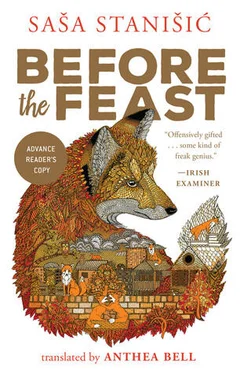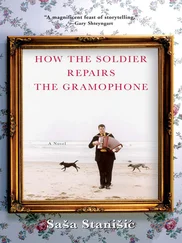“I never led anyone into battle. Did marksmanship only in Kazakhstan, for practice. What we were doing here was to keep the skies safe.”
“The skies?”
“And there was always technical stuff to be serviced and something to be cleaned. Think of that. Think of cleaning anti-aircraft rockets.”
Anna stares at him. Searchingly. Yes, you could say that Anna looks at Herr Schramm searchingly. She stared searchingly at him in his car, and when she fetched her ID from the farm, and when he asked if she knew that the Russians had shot dozens of people in the field under her window.
“Belorussians,” Anna had replied, staring searchingly at him, and she does it again now as he leans his head against the vending machine. If someone intends to kill himself, you keep staring at him.
“Don’t do that,” says Herr Schramm without looking up.
Anna goes on staring. She fetched her asthma spray from home, for emergencies, and also her phone, just in case. She doesn’t want to use it yet. The rain is slackening.
Herr Schramm walks away. At the graveyard, he turns down to the lake. The path is steep and muddy. Anna tries to keep up. Herr Schramm doesn’t mind about the ground and the weather. The name of his father is one of the names on the war memorial in the graveyard.
There’s something unusual just past the graveyard: the bells on the promenade. “Well, I ask you!” says Herr Schramm. “What’s all this, then?” He looks at the bells. The falling raindrops make them ping softly. Anna still has eyes only for him.
“Do you keep having memories tonight too?” she asks.
“I,” says Herr Schramm, “always keep having memories.”
Since Anna found Herr Schramm in his car, they haven’t met anyone. Now she can guess at the painter’s light some way off, against the background of the otherwise dark lake. Only Anna doesn’t want to share Herr Schramm with anyone else now.
“Why do you ask?”
“I won’t be here any more on Monday.”
“Going away. Mhm.”
“I keep remembering my time here and wondering what I’ll miss. I think what I’ll miss most is not spending my youth somewhere else.”
Schramm taps the bells. Puts his large hand on the curved casing of the Old Lady. “We once,” he says, stroking the bell, “had an Uzbek general visiting.”
“Visiting the rockets?”
“Visiting the rockets. He stayed for five days, and after that the unit was never the same again. Everything was going downhill anyway, the economy and so forth, but that wasn’t it. That man, Trunov was his name, spent those five days living with us the way every one of us would have liked to live. When he had gone, everyone fell back into the same old rut, and our morale went off with the General to Uzbekistan or somewhere else.”
“I’d like to understand that if I could.”
“Yes, but I don’t know what it will sound like. .” Schramm smells his hand. “Right, listen. You can’t say that a place or a general is—” Schramm shakes his head. “Trunov told us to lay out a kitchen garden. We didn’t have to do as he said, but we did. We even gave it a name.”
“The Trunov Garden?”
“The Kitchen Garden of Comrade General Paša Trunov. It grew wonderful peppers year after year. My word, it did.”
Herr Schramm coughs, but it could have been a laugh. He crouches down. “Hey, come here. See that?” He points to the ground near the bells. “Someone got stuck here. Those are the tracks of tires.”
“So?”
“Put two and two together.”
Anna isn’t feeling in the mood for riddles. Only now does she seem to see the bells. She doesn’t think them very interesting. Herr Schramm turns away too. He wants to show Anna something, and gets her to climb the wall.
“So now?” says Anna, from on top of the wall.
“Story time,” says Herr Schramm.




THE VIXEN FOLLOWS THE SCENT OF CHICKEN down the lighted stone path between the human earths. There could be danger lurking anywhere here. One is already lurking. A human male. The vixen catches the scent of his shoulder: the injured flesh. He is standing still in front of an earth that she likes to visit herself. Inside it humans do what humans most like doing: they make one thing into other things. They make large, firm, crisp things out of wheat dust. And sometimes, not often, but they are delicious, those things are put out behind the earth, where the vixen waits for them, not often, but they are worth the wait.
She makes a small detour round the human male. This time the makers of things out of wheat dust haven’t left anything out. But the vixen catches the soft scent of chicken feathers behind a row of boards by the next-door earth. She investigates the boards until she finds one slightly raised from the ground. She slips through. A spacious place with the wooden henhouse in a corner. The hens are dreaming. Their sleep is mild with rain.
BEFORE YOU BUILD A CHICKEN RUN, GET TO KNOW all you can about both chickens and foxes. Find out about the instincts of chickens and the stories of the fox.
The Durdens had always been short. Nothing could change that, no wise women or stretching apparatus, no marrying tall people, no hormone treatment — and the last of the Durdens living here, first name Heinrich or Heini, known as Tiny, Fürstenfelde’s last Mayor before the fall of the Wall, was only 1.45 meters tall.
We didn’t think Durden’s stature was worth mentioning. A joke here, a bit of teasing there. It bothered him considerably. It influenced his footwear, it left its mark on what he thought and did, to wit his efforts to wield influence and authority, and it had him always striving for higher things. He had failed as chairman of the Agricultural Production Society under the GDR, he had failed as a husband in three marriages. So he tried his luck as our Mayor.
If you are building a chicken run, you must realize that you are keeping the chickens 100 percent in, but you can’t keep the fox 100 percent out. If he gets in the chickens are at his mercy. The enclosure that was built for their protection becomes a condemned cell.
Durden took up the office of Mayor in ’84; in ’85 the Schliebenhöners went to the West, the only ones here to do so. Did the former event have anything to do with the latter? No one expressed suppositions out loud. It was just that since taking office Durden had gone on and on to the Schliebenhöners about the idea of a house swap. They had a large house but lived alone, and Durden lived alone, but all the same he wanted a big house.
A month after the Schliebenhöners had disappeared, Durden moved in. Their big house had a balcony with a view of the Great Lake, and a kitchen garden surrounded by blackberry bushes, and a large lilac looming over it like a roof. A cherry tree adorned the inner courtyard. The Schliebenhöners had not sold their goat, so that no one would suspect anything.
If you are building a chicken run, make sure that the chickens have enough space to run around and amuse themselves, and if they have dark feathers that they have enough shade in summer. Chickens also need a place to which they can withdraw when the life of a chicken gets to be too much for them. If you are building a chicken run, build the fence at least 1.50 meters high or higher. Anything less will be child’s play to the fox, not an obstacle.
Читать дальше
















